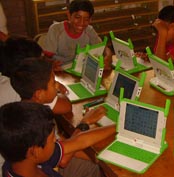Think Locally, Teach Globally
June 21, 2010 - When his mother discovered that 12-year-old Otto de Montenegro was cutting school to earn money working in the coffee fields, she gave him a good talking to.
"The second you lose your right to a pen and pencil," she said, "they're going to put a machete in your hand for the rest of your life."
 The Nicaragua coffee farm where Otto lives — the Finca Buenos Aires — is an extraordinary place run by some extraordinary people. The farm is operated by CISA, a coffee exporter owned by one of Nicaragua's most prominent families, the Baltodanos
The Nicaragua coffee farm where Otto lives — the Finca Buenos Aires — is an extraordinary place run by some extraordinary people. The farm is operated by CISA, a coffee exporter owned by one of Nicaragua's most prominent families, the Baltodanos
A four-generation Penn family, the Baltodanos are among those leading a nascent social responsibility movement in a country where more than half the population subsists below the poverty line. In rural areas, almost 50 percent of the population is illiterate; dropout rates are high.
In 2009, CISA partnered with a Penn GSE research team on a three-year study at the Buenos Aires School of a laptop program the Baltodanos had sponsored to help bridge the digital divide.
This project is documenting how introducing a technology-based curriculum affects the school environment, student learning, approaches to teaching and school, and family and community dynamics.
"This has the potential to be transformative," said Sharon Ravitch, the lead researcher, an expert in international social-justice research and senior lecturer in Penn GSE. "The initiative marks a profound lifestyle, educational, and cultural shift. The program is akin to the 'One Laptop Per Child' program, but it is cutting-edge in this region."
Some educators worry that OLPC suffers from a Western-centric perspective on learning and a top-down approach that doesn't account for local contexts but, rather, imposes outside values upon rural communities.
Ravitch shares these concerns. She found the Baltodanos' idea exciting, but explained that the research literature on the OLPC initiative points to genuine weaknesses in the model, among them a lack of adequate professional development and a failure to account for the community context and infrastructure.
Instead Ravitch proposed a program that would provide intensive, collaborative professional development for teachers, a participatory action research component to design a new curriculum, a significant ethnographic community study, and an evaluation of the program's educational impact on students' and teachers' learning.
Once in Nicaragua, the GSE team began by "breaking the proverbial ice," explains Matthew Tarditi, and then "we quickly transitioned into the integration of computers and technology in the school."
Ravitch is supervising the project, but Tarditi is GSE's man on the ground. A graduate of GSE's Education, Culture, and Society program, Tarditi was originally hired as the project translator. He ended up writing his master's thesis on the issues at the heart of this project — the digital divide and rural poverty — and signed on for a one-year stint on the coffee farm.
Tarditi is not only facilitating the professional development but also continuing the ethnographic study, making daily observations and conducting interviews with parents, students, teachers, and farm personnel.
For the Finca Buenos Aires — and Nicaragua itself — the project's stakes are high. Across Latin America, technology is transforming coffee farming. "People have started wearing handhelds to track their activities in the fields," Ravitch explains. "So if Nicaragua falls behind significantly, it will no longer be competitive in the marketplace."
Add to that the need for leadership. On most farms, middle management workers are recruited from elsewhere. But the Baltodanos want to develop leadership from within the community — and for that they need a well-educated pool of workers.
With such pressing needs in mind, the Baltodanos needed specific and tangible goals for this project: a professional development program and a computer-centered curriculum, both documented in a training manual and curriculum guide that could be used for replication throughout Nicaragua.
"If we innovate," Ravitch says, "if we design an emergent curriculum in a respectful way, that uses a truly democratic process — if we really do this well, it will be worthy of replication."
